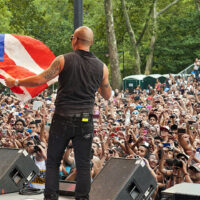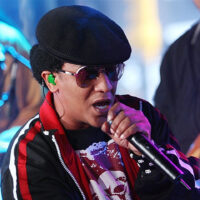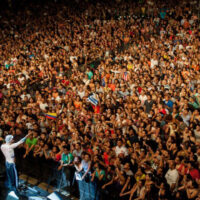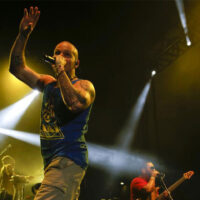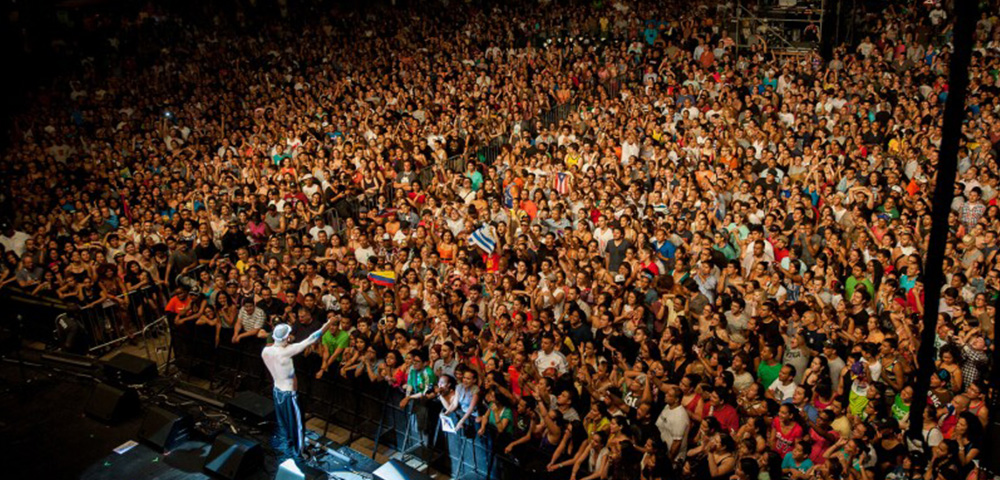
Reggaeton in Puerto Rico
The Caribbean Rhythm that Conquers the World
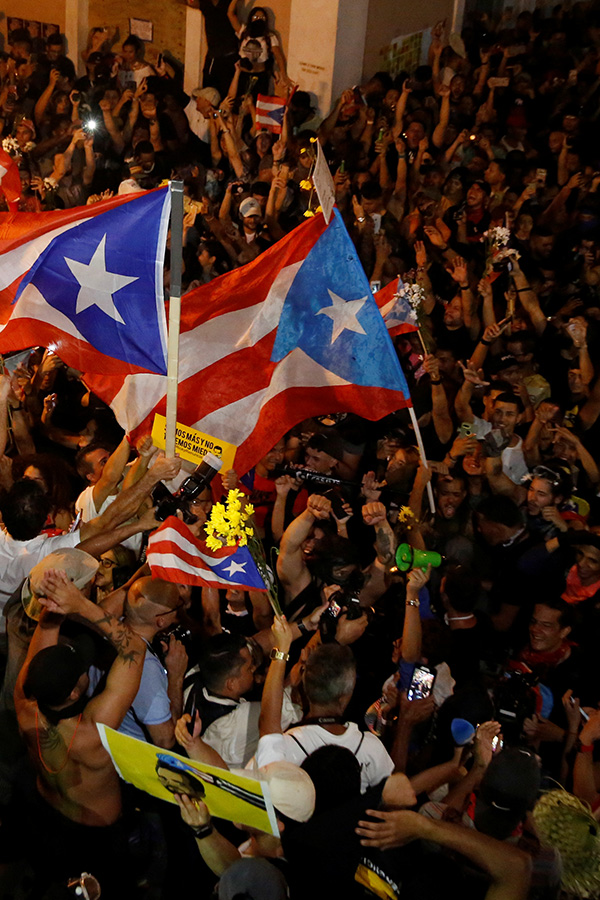
Reggaeton, a genre that blends Jamaican reggae, American hip-hop, and Latin rhythms, has become a global phenomenon. Its infectious beats, catchy hooks, and electrifying energy have taken over international airwaves, but the true soul of reggaeton is undeniably Puerto Rican. This genre, born in the heart of Puerto Rico, has not only redefined the landscape of global music but also carried with it the spirit, struggles, and culture of the island. Reggaeton is not just music—it’s a movement that speaks to the world through the universal language of rhythm, pride, and resilience.
Reggaeton emerged from Puerto Rico’s marginalized neighborhoods in the 1980s, where Afro-Caribbean youth created a sound that reflected their realities—poverty, inequality, and social exclusion. By mixing reggae, hip-hop, and Latin beats with bold, raw lyrics, reggaeton became a voice for the voiceless.
It began as an underground movement but gradually evolved, gaining followers and ultimately exploding on the global stage in the early 21st century. Today, reggaeton continues to shape the cultural, social, and musical landscape worldwide, while its roots remain deeply entrenched in the island’s identity and the broader Latin experience.
The Birth of Reggaeton in Puerto Rico
In the 1980s, Puerto Rico was home to a vibrant underground music scene where young Afro-Caribbean artists were blending sounds from Jamaican dancehall, American hip-hop, and traditional Latin music to create something new. These young artists used drum machines, synthesizers, and improvised beats to create what would become the foundation of reggaeton.
The genre was shaped by the socio-economic struggles of the time. In Puerto Rico’s poorer neighborhoods, reggaeton was a form of expression and resistance. Its lyrics addressed issues such as poverty, crime, racial discrimination, and social inequality. The youth who embraced reggaeton used it as an outlet to express their experiences and frustrations, with artists creating raw and unapologetic lyrics that resonated with people who lived in similar circumstances. At the same time, the music was a celebration of Puerto Rican pride, culture, and resilience.
The pioneers of reggaeton—Daddy Yankee, Tego Calderón, Don Omar, and Nicky Jam—helped give shape to the genre. These artists not only mastered the musical aspects of reggaeton but also became the voice of a generation. Their songs articulated the struggles and triumphs of Puerto Rican youth and became anthems of empowerment and defiance.
Reggaeton’s Global Explosion
The early 2000s marked a turning point for reggaeton. What had been a local phenomenon in Puerto Rico quickly became a global musical force. Artists like Daddy Yankee and Don Omar broke into international markets, and reggaeton began to reach audiences far beyond Latin America. Daddy Yankee’s 2004 hit “Gasolina” became one of the genre’s defining anthems, earning widespread acclaim and radio play across the globe. It was this track that helped reggaeton solidify its place in mainstream music, introducing the world to the infectious rhythms of Puerto Rico.
As reggaeton gained international popularity, it also began to evolve. Artists incorporated new influences, blending reggaeton with dancehall, electronica, R&B, and hip-hop to create a hybrid sound that resonated with an even wider audience. This evolution helped the genre shed its niche status and become a dominant force in global pop music.
In the following years, artists like J Balvin, Maluma, and Bad Bunny took reggaeton to new heights. Songs like “Despacito” (Luis Fonsi and Daddy Yankee) broke international records, proving that reggaeton was no longer a genre for just Latin listeners but one that could dominate global charts. Bad Bunny, in particular, has become a trailblazer, pushing the boundaries of reggaeton and influencing not just music but fashion, culture, and social movements. His rise has helped shape the genre’s future, blending reggaeton with trap, pop, and experimental music to create an evolving sound that speaks to today’s global audience.
Reggaeton: A Cultural Movement
Reggaeton is more than just music—it is a cultural revolution. The genre has evolved into a symbol of Latin pride and identity, and it plays an integral role in the fight against social injustice. Its lyrics often tackle issues of race, gender, and inequality, giving a voice to marginalized communities that have been historically excluded from mainstream culture. Through reggaeton, artists speak out against corruption, social inequality, and the struggles of everyday life. The genre has been a powerful platform for social change, allowing people from different walks of life to connect through shared experiences.
In Puerto Rico, reggaeton has become an emblem of resilience. Despite facing political and economic challenges, the genre continues to thrive, bringing attention to the island’s culture and issues on a global scale. As reggaeton artists have risen to international prominence, they have helped elevate Puerto Rican identity on the world stage. It has become an expression of the island’s spirit—vibrant, resilient, and always evolving.
At the same time, reggaeton has brought Puerto Rican culture into the global spotlight. The genre has become one of the island’s most important cultural exports, generating millions of dollars in revenue and creating jobs in the music, tourism, and entertainment industries. Puerto Rico has benefited economically from reggaeton’s success, and the genre has helped foster tourism, as people flock to the island to experience its vibrant culture firsthand.
Reggaeton and Social Advocacy
In addition to its musical influence, reggaeton has become an important tool for advocacy and social change. The genre has given a platform to artists to speak out on issues ranging from racial inequality to political corruption. In Puerto Rico, reggaeton artists have been vocal in the aftermath of disasters such as Hurricane Maria, using their fame to raise awareness and contribute to recovery efforts. These artists, who have long used their platforms to challenge societal norms, also used their voices to push for accountability and justice in the wake of the hurricane’s devastation.
Moreover, reggaeton has become a space for female empowerment. While the genre was initially dominated by male artists, women have steadily made their mark in the reggaeton world. Pioneers like Ivy Queen paved the way for the next generation of female reggaeton artists, such as Karol G and Natti Natasha. These women have broken barriers and redefined what it means to be a successful reggaeton artist. Their rise has inspired countless young women, particularly in Latin America, to pursue their own artistic ambitions and take control of their narratives.
The Future of Reggaeton
The future of reggaeton is bright. As the genre continues to evolve, new subgenres like Latin trap and reggaeton electrónico are emerging, adding new layers to its sound. Reggaeton continues to innovate, incorporating more diverse musical influences from around the world while retaining its Caribbean roots. The genre’s global appeal is expanding, with artists collaborating across borders and genres, proving that reggaeton is no longer just a Latin phenomenon but a force that transcends cultural and linguistic boundaries.
The genre’s influence is also growing in the digital age, with streaming platforms allowing reggaeton artists to reach new audiences more quickly and efficiently than ever before. As reggaeton continues to shape global music culture, the genre’s roots in Puerto Rican identity remain central to its growth and success.
At its core, reggaeton is a celebration of life, love, and pride. It is a genre that has empowered marginalized communities, challenged social norms, and provided a soundtrack for a generation. With its dynamic sound and ability to connect people across cultures, reggaeton will continue to dominate global music scenes for years to come. Born in the streets of Puerto Rico, reggaeton is a genre that will always be rooted in the island’s vibrant culture, its struggles, and its resilience.


